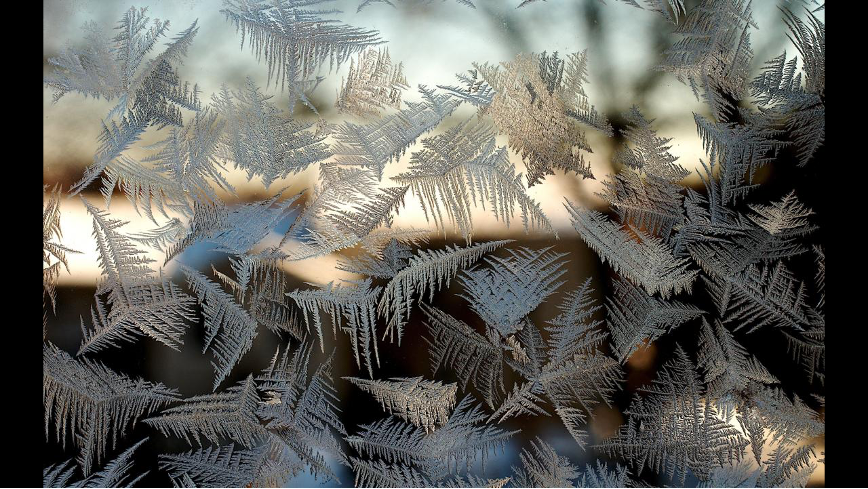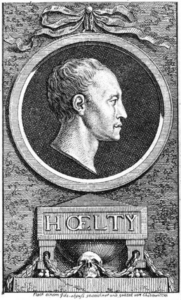Winter song
(Poet's title: Winterlied)
Set by Schubert:
D 401
[May 13, 1816]
Keine Blumen blühn;
Nur das Wintergrün
Blickt durch Silberhüllen,
Nur das Fenster füllen
Blumen rot und weiß,
Aufgeblüht aus Eis.
Ach! kein Vogelsang
Tönt mit frohem Klang;
Nur die Winterweise
Jener kleinen Meise,
Die am Fenster schwirrt,
Und um Futter girrt.
Minne flieht den Hain,
Wo die Vögelein
Sonst im grünen Schatten
Ihre Nester hatten;
Minne flieht den Hain,
Kehrt ins Zimmer ein.
Kalter Januar,
Hier werd ich fürwahr
Unter Minnespielen
Deinen Frost nicht fühlen!
Walte immerdar,
Kalter Januar!
No flowers are in bloom;
Only the winter green
Is peeping through the silver covering;
It is only the window that is full
Of red and white flowers
Blooming in the ice.
Alas, there is no bird song
Ringing out with a jolly sound
Except for the winter call
Of that little Great tit
Flying around the window
And chirruping as it begs for food.
Love escapes from the grove
Where the little birds
Used to be in the green shade
And had their nests;
Love escapes from the grove
And returns indoors.
Cold January,
I shall definitely stay here
Playing love games
And I shall not feel your cold!
Long may you reign,
Cold January!
All translations into English that appear on this website, unless otherwise stated, are by Malcolm Wren. You are free to use them on condition that you acknowledge Malcolm Wren as the translator and schubertsong.uk as the source. Unless otherwise stated, the comments and essays that appear after the texts and translations are by Malcolm Wren and are © Copyright.
☙
Themes and images in this text:
Birds Cold Covers and covering Flowers Frost and ice Games and play Green Nests Red and purple Silver Songs (general) White Windows Winter Woods – groves and clumps of trees (Hain)
We begin with negatives: there are no flowers, there are no birds singing. It is not spring. Yet there ARE flowers, created in the pattern of the ice on the windows. There is even colour, white of course, but also red as the morning or evening sun catches the frozen windows. There is some evergreen peeping through the covering of ice and snow. There IS a bird singing, one of those over-wintering tits that depends on human scraps at this time of year.
All of this reminds us of the scene in the woods in spring as the birds build their nests and breed. The lesson we take from that is that human beings are not birds. Our love-games are not restricted to a single season, and our nesting is not dependent on decent weather. The repeated references to the window remind us that we can live and love indoors. We can look out on a frozen landscape and not be at risk of freezing or starving. Our song doesn’t need to be a cry for help (as is the Great tit’s), since we can continue to make ‘mating calls’ (as birds do only in the breeding season) at any time. Love has not flown away, it has just fled indoors.


https://commons.wikimedia.org/wiki/File%3ATit_the_bird_and_thanks_for_looking.JPG
☙
Original Spelling and note on the text Winterlied Keine Blumen blühn; Nur das Wintergrün Blickt durch Silberhüllen; Nur das Fenster füllen Blumen1 roth und weiß, Aufgeblüht aus Eis. Ach! kein Vogelsang Tönt mit frohem Klang; Nur die Winterweise Jener kleinen Meise, Die am Fenster schwirrt, Und um Futter girrt. Minne flieht den Hain, Wo die Vögelein Sonst im grünen Schatten Ihre Nester hatten; Minne flieht den Hain, Kehrt ins Zimmer ein. Kalter Januar, Hier werd' ich fürwahr, Unter Minnespielen, Deinen Frost nicht fühlen! Walte immerdar, Kalter Januar! 1 Schubert changed 'Blümchen' (little flowers) to 'Blumen' (flowers)
Hölty’s original, before Voß modified it:
Keine Blumen blühn, Nur das Wintergrün Blickt durch Silberhüllen, Nur das Fenster füllen Blümchen, roth und weiß, Aufgeblüht aus Eis. Ach, kein Vögelsang Tönet süßen Klang, Als die Winterweise Mancher kleinen Meise, Die am Fenster schwirrt, und ihr Liedchen girrt. Minne flieht den Hain, Wo die Vögellein, Finken, Nachtigallen Ihr so wohl gefallen, Minne flieht den Hain, Kehrt ins Zimmer ein. Alles Kummers bar, Werden wir fürwahr, Unter Minnespielen, Deinen Frost nicht fühlen, Kalter Januar; Walte immerdar.
Confirmed with Ludwig Christoph Heinrich Hölty’s Sämtliche Werke kritisch und chronologisch herausgegeben von Wilhelm Michael, Erster Band, Weimar, Gesellschaft der Bibliophilen, 1914, page 120.
Confirmed by Peter Rastl with Schubert’s source, Gedichte von L. H. Ch. Hölty. Neu besorgt und vermehrt von Johann Heinrich Voß. Wien, 1815. Bey Chr. Kaulfuß und C. Armbruster. Gedruckt bey Anton Strauß. Meisterwerke deutscher Dichter und Prosaisten. Drittes Bändchen. pages 142-143; with Gedichte von Ludewig Heinrich Christoph Hölty. Besorgt durch seine Freunde Friederich Leopold Grafen zu Stolberg und Johann Heinrich Voß. Hamburg, bei Carl Ernst Bohn. 1783, pages 138-139; and with Poetische Blumenlese für das Jahr 1778. Herausgegeben von Joh. Heinr. Voß. Hamburg, bey Carl Ernst Bohn, pages 8-9.
First published in this version edited by Voß.
To see an early edition of the text, go to page 142 [220 von 300] here: http://digital.onb.ac.at/OnbViewer/viewer.faces?doc=ABO_%2BZ15769170X


